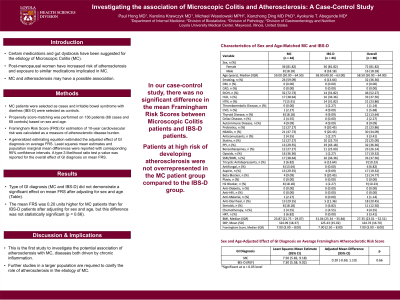Tuesday Poster Session
Category: Colon
P3014 - Investigating the Association of Microscopic Colitis and Atherosclerosis: A Case-Control Study
Tuesday, October 24, 2023
10:30 AM - 4:00 PM PT
Location: Exhibit Hall

Has Audio

Paul P. Hong, MD
Loyola University Medical Center
Chicago, IL
Presenting Author(s)
Paul P.. Hong, MD, Karolina Krawczyk, MD, Michael Wesolowski, MPH, Xianzhong Ding, MD, Ayokunle T.. Abegunde, MD
Loyola University Medical Center, Maywood, IL
Introduction: Microscopic colitis (MC) is an inflammatory disease of the colon characterized by chronic watery diarrhea. Etiology is unclear but certain medications and gut dysbiosis have been suggested. Post-menopausal women have increased risk of atherosclerosis and exposure to similar medications implicated in MC. Given both diseases are driven by chronic inflammation, MC and atherosclerosis may have a possible association.
Methods: For this case-control study, patients with irritable bowel syndrome with diarrhea (IBS-D) were selected as controls as they share similar clinical characteristics (chronic watery diarrhea) and epidemiological factors (preponderance in females). Propensity score-matching was performed on 136 patients (68 MC and 68 IBS-D controls) on sex and age. Framingham Risk Score (FRS) for estimation of 10-year cardiovascular risk was calculated as a measure of atherosclerotic disease burden. Out of 68 matched pairs, 44 were analyzed. A generalized estimating equation estimated the adjusted effect of GI diagnosis (MC in reference to IBS-D) on average FRS. Least squares mean estimates and population marginal mean differences were reported with corresponding 95% confidence intervals, and a type-3 likelihood ratio test p-value was reported for the overall effect of GI diagnosis on mean FRS.
Results: The standardized difference resulting from the propensity score matching was 0 for sex and 0.1 for age, suggesting a successful match of cases and controls. Patient characteristics are reported for cases and controls (Table). Type of GI diagnosis (MC and IBS-D) did not demonstrate a significant effect on mean FRS after adjusting for sex and age (Table). The mean FRS was 0.20 units higher for MC patients than for IBS-D patients after adjusting for sex and age, but this difference was not statistically significant (p = 0.66).
Discussion: This is the first study to investigate the potential association of atherosclerosis with MC. After adjusting for sex and age, there was no significant difference in the mean FRS between patients with MC and IBS-D. This suggests that patients at high risk of developing atherosclerosis were not overrepresented in the MC patient group compared to the IBS-D group. Further studies in a larger population are required to clarify the role of atherosclerosis in the etiology of MC.
Disclosures:
Paul P.. Hong, MD, Karolina Krawczyk, MD, Michael Wesolowski, MPH, Xianzhong Ding, MD, Ayokunle T.. Abegunde, MD. P3014 - Investigating the Association of Microscopic Colitis and Atherosclerosis: A Case-Control Study, ACG 2023 Annual Scientific Meeting Abstracts. Vancouver, BC, Canada: American College of Gastroenterology.
Loyola University Medical Center, Maywood, IL
Introduction: Microscopic colitis (MC) is an inflammatory disease of the colon characterized by chronic watery diarrhea. Etiology is unclear but certain medications and gut dysbiosis have been suggested. Post-menopausal women have increased risk of atherosclerosis and exposure to similar medications implicated in MC. Given both diseases are driven by chronic inflammation, MC and atherosclerosis may have a possible association.
Methods: For this case-control study, patients with irritable bowel syndrome with diarrhea (IBS-D) were selected as controls as they share similar clinical characteristics (chronic watery diarrhea) and epidemiological factors (preponderance in females). Propensity score-matching was performed on 136 patients (68 MC and 68 IBS-D controls) on sex and age. Framingham Risk Score (FRS) for estimation of 10-year cardiovascular risk was calculated as a measure of atherosclerotic disease burden. Out of 68 matched pairs, 44 were analyzed. A generalized estimating equation estimated the adjusted effect of GI diagnosis (MC in reference to IBS-D) on average FRS. Least squares mean estimates and population marginal mean differences were reported with corresponding 95% confidence intervals, and a type-3 likelihood ratio test p-value was reported for the overall effect of GI diagnosis on mean FRS.
Results: The standardized difference resulting from the propensity score matching was 0 for sex and 0.1 for age, suggesting a successful match of cases and controls. Patient characteristics are reported for cases and controls (Table). Type of GI diagnosis (MC and IBS-D) did not demonstrate a significant effect on mean FRS after adjusting for sex and age (Table). The mean FRS was 0.20 units higher for MC patients than for IBS-D patients after adjusting for sex and age, but this difference was not statistically significant (p = 0.66).
Discussion: This is the first study to investigate the potential association of atherosclerosis with MC. After adjusting for sex and age, there was no significant difference in the mean FRS between patients with MC and IBS-D. This suggests that patients at high risk of developing atherosclerosis were not overrepresented in the MC patient group compared to the IBS-D group. Further studies in a larger population are required to clarify the role of atherosclerosis in the etiology of MC.
Disclosures:
Paul Hong indicated no relevant financial relationships.
Karolina Krawczyk indicated no relevant financial relationships.
Michael Wesolowski indicated no relevant financial relationships.
Xianzhong Ding indicated no relevant financial relationships.
Ayokunle Abegunde indicated no relevant financial relationships.
Paul P.. Hong, MD, Karolina Krawczyk, MD, Michael Wesolowski, MPH, Xianzhong Ding, MD, Ayokunle T.. Abegunde, MD. P3014 - Investigating the Association of Microscopic Colitis and Atherosclerosis: A Case-Control Study, ACG 2023 Annual Scientific Meeting Abstracts. Vancouver, BC, Canada: American College of Gastroenterology.
